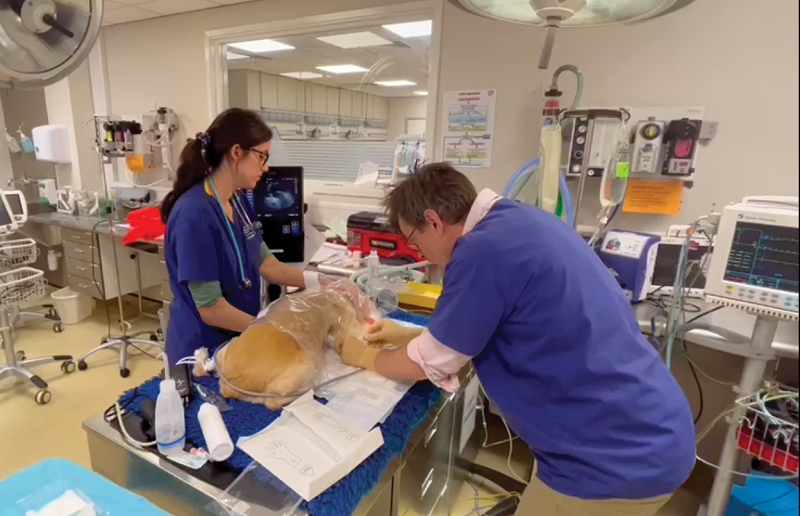Canine Pericardial Effusion Biobank for Diagnostic Advancements
Clinical Connections – Autumn 2022
The RVC is compiling a biobank of fluids removed from around the heart, enabling pioneering research aimed at developing new diagnostic tests to help dogs at the RVC and beyond. It appears to be the first such biobank of pericardial effusion (PE) samples in dogs globally.
Between the busy first opinion out-of-hours emergency service and the Emergency and Critical Care referral service at the Queen Mother Hospital for Animals (QMHA), around 30 dogs with PE are presented per year. The emergency services are therefore in an excellent position to compile the biobank using fresh PE samples.
Pericardial effusion is a life-threatening condition that requires emergency stabilisation. Neoplasia is the underlying cause in approximately two thirds of cases, with the diagnosis of neoplasia of the heart reliant on echocardiography or computed tomography to look for a mass. However, even then, a specific diagnosis may not be possible. Furthermore, many vets do not have the facilities to perform advanced imaging or may not have the option of referral to a tertiary hospital, therefore the diagnosis is often challenging.

As the PE fluid needs to be drained emergently as part of treatment, an excellent opportunity exists for samples to be collected and tested further in a laboratory to try to determine if the fluid is neoplastic or not. This initiative, to store samples in novel ways for use in future studies, will involve the Emergency and Critical Care team, clinical and anatomic pathology specialists, specialist technicians and the Clinical Investigation Centre.
Biomarkers and diagnostic advancements
New, innovative techniques not yet applied to this type of sample will be employed, including the preparation of a ‘cell block’ from the PE. Cytology is commonly performed on PE samples, but it is often difficult even for specialist pathologists to differentiate neoplastic from reactive mesothelial cells.
Preparation of a cell block from effusion samples has been evaluated for other body cavity effusions and the results have been found to correlate well with tissue biopsy samples. Investigators will therefore be evaluating whether these samples can be used to diagnose neoplastic causes of effusion in a clinical scenario where tissue biopsy is infrequently performed.
By providing a means of storing these samples in multiple formats for the long term, the biobank would facilitate future research projects. New techniques could be investigated, for example the use of immunofluorescent staining of the cell blocks.
The team aims to investigate the use of novel markers that could help differentiate neoplastic from non-neoplastic causes of PE. For example, the measurement of lactate dehydrogenase in both serum and PE samples has been evaluated in cases of PE in humans. Lactate dehydrogenase has been evaluated in healthy dogs and dogs with various types of cancer and further work is needed to determine if this could be a useful test in dogs with PE.
Vascular endothelial growth factor is another biomarker that has been investigated in people and found to be significantly higher in malignant pericardial effusions compared to non-malignant pericardial effusions, but this biomarker has not been evaluated in PE from dogs.
The biobank and laboratory tests are being funded by a grant from the RVC Animal Care Trust. Research enabled by the biobank would greatly contribute to the diagnosis of causes of PE in dogs, a field in which there has been little advancement in recent years. The over-arching aims are to discover and translate new knowledge into clinical practice, while providing the best clinical care for the patients presenting to the QMHA and to provide expert opinion to veterinary practitioners worldwide. This research will benefit dogs with this condition and identification of a technique to differentiate malignant from non-malignant effusion would be of great benefit to owners also.
The QMHA is the largest and most advanced small animal veterinary hospital in Europe and the RVC has an established reputation in conducting clinical research in dogs with PE. The RVC’s residents (veterinary specialists-in-training) and specialists are encouraged to explore and pursue research ideas such as this biobank alongside their clinical work.
RVC researchers are keen to develop collaborative efforts with external partners using these samples. For further information please contact qmhreception@rvc.ac.uk.
